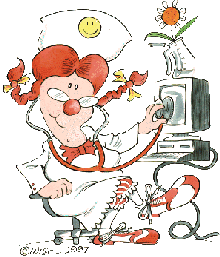
Patty Wooten presents ... 
Creating a Comedy Cart
From Journal of Nursing Jocularity, Winter 1991, 1(4), pp 46-47.Greetings and giggles from Nancy Nurse, with more information to help you increase your smileage from life. Previous articles have explored some of the theory and research about how humor and laughter relate to our physical and emotional health. This article will discuss how one hospital made practical application of these theories.
In September of 1988, Morton Plant Hospital in Clearwater, Florida, (see Bubbly-ography, page 44) obtained a grant from the "Humor Project" in Saratoga Springs, New York to help fund the creation of a comedy cart. They began by forming a hospital wide committee and creating individual task groups to develop each section of the cart. The cart was divided into six separate sections: audio cassettes, cartoon albums, video tapes, humorous books, small games and costume parts, props and magic tricks. Each task force was responsible for screening potential material and for selecting a variety that would be most appealing to patients and visitors.
A large cart was designed and built by hospital engineering to include different sections for each modality and large cabinet doors that could be locked. A special slot was included in the cart for the return of materials when staff was not present. A log book was created to maintain a record of materials checked out to patients, including date, time, patient name and room number, and the item that was borrowed.
Leslie Gibson, RN, BSN was one of the primary people involved in the planning and implementation of the cart. She recommends that a facility planning this service begin with a small target area that provides more long term care for patients (orthopedics, rehab, etc.) and to eventually extend service to other parts of the institution as interest and funding are available. Staff and community awareness and support are very important, so introduce the program with a big kick-off party with clowns, balloons, music and local press coverage. Leslie was able to limit excessive cost by utilizing National Library Services for the Blind, Visually Impaired and Physically Handicapped, a government service which provides "Talking Books" and small and large audio cassette players for the physically handicapped. This service is coordinated through local and regional libraries and it is free. To obtain a list of the libraries in your area call or write to: 1291 Taylor St. N.W., Washington DC 20542. Morton Plant Hospital obtained a large selection on "permanent loan".
Another major concern of facilities considering this service is the possible violation of copyright laws. In 1989, legislation was introduced in both the House and Senate that would have amended the Copyright Act to explicitly permit the viewing of films by residents of nursing homes (S1557 and H.R. 3158). At that time it was believed it would take almost six years to pass that bill.
American Association of Homes for the Aging, American Health Care Association, and the National Association of Activity Professionals negotiated an agreement through the Motion Picture Association of America to allow residents of "nursing homes" to view copyrighted videocassettes on television. "Nursing homes" are collectively defined as nursing homes, hospices, hospitals, retirement homes, or other such group homes that provide long-term or health-related care and services to individuals on a regular basis.
Limitations to this agreement state that fees may not be charged to the viewers and that equipment used must be similar to that used in the home. No closed circuit television or wide screen viewing is covered by this agreement.
Studios which are covered by such agreements are: Columbia, Paramount, Turner Home, M.C.A., Inc., Warner Brothers, Disney, MGM/United Artist, Century Fox, and Orion Pictures. This agreement expires 31 December 2001.
It is implied in the bulletin which I received from American Association of Homes for the Aging that membership in the association is important for this agreement to cover individual facilities. You may wish to obtain a copy of this bulletin or address questions to: A.A.H.A., 1129-20th Street N.W. Suite 400, Washington DC or call .
Since the birth of their idea in January of 1989, Morton Plant Hospital has developed six humor carts which are staffed by auxiliary volunteers on weekday afternoons. They also provide hospital clown visits (upon request by the patient or family) and clown training to interested community volunteers. Having done the basic groundwork, they are willing to share with others what they have learned. Contact the Education Department at the hospital. The efforts of Leslie Gibson and the staff at Morton Plant Hospital deserve recognition for developing this practical application and praise for successfully bringing humor theory to the bedside.
This article was originally published in "Jest for the Health of It", a regular feature in the Journal of Nursing Jocularity.
Feature columnist Patty Wooten, BSN, is also a past President of the American Association for Therapeutic Humor, author of two books related to humor, and a national speaker presenting on the benefits of humor.
